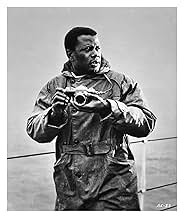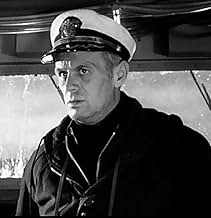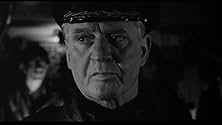IMDb RATING
7.3/10
6.5K
YOUR RATING
An American destroyer Captain is determined to confront a Soviet submarine caught violating territorial waters. Perhaps too determined.An American destroyer Captain is determined to confront a Soviet submarine caught violating territorial waters. Perhaps too determined.An American destroyer Captain is determined to confront a Soviet submarine caught violating territorial waters. Perhaps too determined.
- Director
- Writers
- Stars
- Nominated for 1 BAFTA Award
- 1 nomination total
James MacArthur
- Ens. Ralston
- (as James Macarthur)
Mike Lennox
- Lt. Krindlemeyer U.S.N. - Bridge
- (as Michael Graham)
Stephen Schreiber
- Seaman 2nd Class - Bridge
- (as Stephen Von Schreiber)
- Director
- Writers
- All cast & crew
- Production, box office & more at IMDbPro
Featured reviews
The Bedford Incident is a Cold War Navy story with the captain of the destroyer, USS Bedford playing a game of cat and mouse with a Soviet submarine which has strayed inside the territorial waters of Greenland.
These kinds of things happened quite a lot during those tension filled days of the Cold War. Fortunately neither we or the Soviets had a captain like Richard Widmark who is determined to push the envelope all the way if he can.
On the voyage that this game of nuclear tag takes place, Widmark is saddled with a pair of outsiders and he doesn't like it at all. First is Sidney Poitier a photojournalist who constantly keeps getting underfoot as Widmark sees it. The second is a medical officer Martin Balsam whom he didn't request.
Widmark is a frightening man. He keeps everything and everyone on the ship so tense he's even got Eric Portman concerned. Portman is a NATO adviser and a former German U-Boat commander. As Poitier says, 'Hitler's Navy to which he's corrected, 'no Admiral Doenitz's Navy.
Under his command, young ensign James MacArthur is afraid to breathe wrong and sonar man Wally Cox suffers a nervous breakdown. The lack of relief for both of these guys has tragic results.
The Bedford Incident remains a curiously forgotten film while such work as Dr. Strangelove and Failsafe people remember better. That's not right, The Bedford Incident is in some respects superior to both of those classics. It's about the strain of command as much as anything else and it's also about the dangers of a truculent attitude in the person with the command.
Hopefully this forgotten classic will get more recognition one day.
These kinds of things happened quite a lot during those tension filled days of the Cold War. Fortunately neither we or the Soviets had a captain like Richard Widmark who is determined to push the envelope all the way if he can.
On the voyage that this game of nuclear tag takes place, Widmark is saddled with a pair of outsiders and he doesn't like it at all. First is Sidney Poitier a photojournalist who constantly keeps getting underfoot as Widmark sees it. The second is a medical officer Martin Balsam whom he didn't request.
Widmark is a frightening man. He keeps everything and everyone on the ship so tense he's even got Eric Portman concerned. Portman is a NATO adviser and a former German U-Boat commander. As Poitier says, 'Hitler's Navy to which he's corrected, 'no Admiral Doenitz's Navy.
Under his command, young ensign James MacArthur is afraid to breathe wrong and sonar man Wally Cox suffers a nervous breakdown. The lack of relief for both of these guys has tragic results.
The Bedford Incident remains a curiously forgotten film while such work as Dr. Strangelove and Failsafe people remember better. That's not right, The Bedford Incident is in some respects superior to both of those classics. It's about the strain of command as much as anything else and it's also about the dangers of a truculent attitude in the person with the command.
Hopefully this forgotten classic will get more recognition one day.
Along the same lines as FailSafe this is a tense Cold War drama with a cat and mouse game going on between an iron willed Navy Captain and an essentially unseen Soviet submarine. Great performances all around are what make this a good film. Richard Widmark is great as the somewhat tyrannical ships skipper who has his crew drilled, trained and poised for all out war up to the breaking point. Sidney Poitier as always does another superb job as the journalist aboard to do a story of a Navy deployment and gets more than what was expected. Despite the fact that an individual like the Poitier character would not enjoy that much freedom aboard a US Naval vessel this motion picture is quite realistic. Martin Balsam and James MacArthur also put in outstanding performances with Balsam as a newly arrived unappreciated ships doctor and MacArthur as an Ensign who is dogged endlessly by his commanding officer.
Richard Widmark is a determined naval ship captain in "The Bedford Incident," which also stars Sidney Poitier, Eric Portman, Martin Balsam, James Macarthur, and Wally Cox.
This is quite a different meeting from the one Widmark and Poitier had in "No Way Out," where Widmark is a bigot who lashes out at Poitier. Poitier in this film plays a journalist, and there is never any mention of his color. This is not only remarkable but marvelous.
Martin Balsam is the ship's new doctor. Poitier and Balsam board ship together and pick up almost immediately that there is a tension on board and that the men are intimidated by their cold, tough captain.
The Bedford's assignment is to patrol for Russian subs and ships.
When a submarine is detected in the area, the captain seems to want to take the matter too far. Portman, as a German adviser, disagrees with him.
The role of the captain, Finlander, is the type of role normally associated with Widmark, and he is excellent as an uncompromising man reminiscent of Captain Queeg.
Poitier turns in a stellar performance, which really builds as he becomes more and more concerned about the captain and the potential international situation. Martin Balsam is very good, actually providing, along with Wally Cox, a little comic relief.
The scenes showing the gray sea and huge icebergs might be dated now, given what film technology is capable of, but they are no less evocative of the atmosphere.
After the buildup of drama and tension, the last moments of the film are incredibly exciting - staggering even. And you'll do what I did - just sit and stare at the words "The End." A very good film.
This is quite a different meeting from the one Widmark and Poitier had in "No Way Out," where Widmark is a bigot who lashes out at Poitier. Poitier in this film plays a journalist, and there is never any mention of his color. This is not only remarkable but marvelous.
Martin Balsam is the ship's new doctor. Poitier and Balsam board ship together and pick up almost immediately that there is a tension on board and that the men are intimidated by their cold, tough captain.
The Bedford's assignment is to patrol for Russian subs and ships.
When a submarine is detected in the area, the captain seems to want to take the matter too far. Portman, as a German adviser, disagrees with him.
The role of the captain, Finlander, is the type of role normally associated with Widmark, and he is excellent as an uncompromising man reminiscent of Captain Queeg.
Poitier turns in a stellar performance, which really builds as he becomes more and more concerned about the captain and the potential international situation. Martin Balsam is very good, actually providing, along with Wally Cox, a little comic relief.
The scenes showing the gray sea and huge icebergs might be dated now, given what film technology is capable of, but they are no less evocative of the atmosphere.
After the buildup of drama and tension, the last moments of the film are incredibly exciting - staggering even. And you'll do what I did - just sit and stare at the words "The End." A very good film.
You can't watch this movie without being impressed by the performance of Richard Widmark. He was absolutely outstanding as Captain Eric Finlander - a totally obsessed Cold Warrior in command of an American warship off the coast of Greenland. Having detected a Soviet submarine in the same area, Finlander becomes fixated on forcing the sub to surface. It might be "peacetime" (even if it is the Cold war) but Finlander wants to prove to the world that the Soviets were where they shouldn't be. The best moment of the movie probably came when the West German commodore and former U-Boat commander in World War II (played by Eric Portman) aboard Finlander's vessel the Bedford described Finlander as "frightening." That pretty much summed things up - and Widmark captured the description perfectly. There's a strong supporting cast in this (it includes Sidney Poitier as a reporter on board and Martin Balsam as the Bedford's new medical officer) but it's Widmark's movie from start to finish.
This would be best described as a tense and suspenseful movie but there are scattered times throughout when you start to wonder if this is all worth it. It is, after all, depicting the COLD War. Nothing's really going to happen as a result of all this. It looks like an interesting depiction of a cat and mouse game between the Bedford and the sub, but really it comes across as more of a psychological study of Finlander himself and you do wonder if the tension and suspense are going to lead up to unrealized potential and leave the viewer frustrated. They don't.
The end of this movie is quite shocking, and captures what the fears of a lot of people during the Cold War were - the fears of a nuclear accident or even an accidental nuclear war. Those fears were very real in people in the era, and this movie plays on those fears. The end actually is quite stunning. It grows out of the psychological study - Finlander having ridden a young officer (played by James MacArthur) so hard that he was so afraid of doing something wrong that you almost knew he would have to do something wrong. He does. This is a very well done film. (7/10)
This would be best described as a tense and suspenseful movie but there are scattered times throughout when you start to wonder if this is all worth it. It is, after all, depicting the COLD War. Nothing's really going to happen as a result of all this. It looks like an interesting depiction of a cat and mouse game between the Bedford and the sub, but really it comes across as more of a psychological study of Finlander himself and you do wonder if the tension and suspense are going to lead up to unrealized potential and leave the viewer frustrated. They don't.
The end of this movie is quite shocking, and captures what the fears of a lot of people during the Cold War were - the fears of a nuclear accident or even an accidental nuclear war. Those fears were very real in people in the era, and this movie plays on those fears. The end actually is quite stunning. It grows out of the psychological study - Finlander having ridden a young officer (played by James MacArthur) so hard that he was so afraid of doing something wrong that you almost knew he would have to do something wrong. He does. This is a very well done film. (7/10)
I must confess I'd not heard of this film as it was off my radar (no pun intended) despite starring those two fine actors Sidney Poitier and Richard Widmark in the leads and the solid Martin Balsam in support. More fool me as it proved to be a fine, gritty Cold War thriller, highlighting explicitly then and still, I'd contend, now, that one wilful or accidental action in the heat of the moment could lead to catastrophe for the world. The film skilfully combines a study of men under pressure with the wider political picture, at the same time cleverly invoking the classic story of Moby Dick, with Widmark's Captain Freelander as obsessed with catching a fleeing Russian submarine as old Captain Ahab was his pesky whale.
All the action takes place on Freelander's US navy destroyer encompassing a gradually increasing character examination of the wilful Captain, driving his crew to exhaustion and the end of their wits by keeping them constantly at attention or GQ as it's called here, so that in the end a simple misunderstanding by a pressurised, even terrorised young officer of a phrase used by the captain in conversation leads to disaster. The abrupt ending is particularly memorable, the better for being so inevitable and brutal.
Widmark as the crusty old captain is excellent in his portrayal of this particular single-minded sailor, while Poitier is also fine as the journalist who by questioning the captain's methods effectively acts as the conscience of the film, for once his skin colour having no bearing on his character''s relevance to the plot. Balsam too steps up as the passed over new medical officer who yet predicts the climactic outcome from way back.
Tautly directed in black and white, the tension is palpable as the American ship closes in on its prey and nerves become frayed to breaking point on the bridge, in so doing making an early case for greater psychological consideration due to crew members as advocated by Balsam's character.
Topical and relevant, especially with recent events echoing even today in Syria, this is an unflinching and superbly acted contemporary thriller which deserves to be better known.
All the action takes place on Freelander's US navy destroyer encompassing a gradually increasing character examination of the wilful Captain, driving his crew to exhaustion and the end of their wits by keeping them constantly at attention or GQ as it's called here, so that in the end a simple misunderstanding by a pressurised, even terrorised young officer of a phrase used by the captain in conversation leads to disaster. The abrupt ending is particularly memorable, the better for being so inevitable and brutal.
Widmark as the crusty old captain is excellent in his portrayal of this particular single-minded sailor, while Poitier is also fine as the journalist who by questioning the captain's methods effectively acts as the conscience of the film, for once his skin colour having no bearing on his character''s relevance to the plot. Balsam too steps up as the passed over new medical officer who yet predicts the climactic outcome from way back.
Tautly directed in black and white, the tension is palpable as the American ship closes in on its prey and nerves become frayed to breaking point on the bridge, in so doing making an early case for greater psychological consideration due to crew members as advocated by Balsam's character.
Topical and relevant, especially with recent events echoing even today in Syria, this is an unflinching and superbly acted contemporary thriller which deserves to be better known.
Did you know
- TriviaAlthough by this point Sidney Poitier had been making films for 15 years, this was the first film he made in which his race was neither mentioned nor relevant.
- GoofsWhile at General Quarters (battle stations), some officers of the USS Bedford are shown wearing dress blue uniforms. In the mid-1960s, both officers and chiefs wore khaki uniforms while at sea.
- Quotes
[after Finlander orders an anti-submarine rocket armed]
Commodore Schrepke: This is insane!
Captain Finlander: Now don't worry, Commodore. The Bedford'll never fire first. But if he fires one, I'll fire one.
Ensign Ralston: [launching the rocket] Fire One!
- Alternate versionsReportedly, there are two versions with different endings. One version ends with a missile being fired and a torpedo being released from the sub seconds before. In another version the sub is destroyed, and later that evening the German commodore is found aiming a .45 at the nose cone of a live missile. The captain asks why, the commodore gives some reply and pulls the trigger. Mr. Munceford is blown over the side, but survives.
- ConnectionsFeatured in WatchMojo: Top 10 Cold War Movies (2014)
- How long is The Bedford Incident?Powered by Alexa
Details
- Release date
- Countries of origin
- Languages
- Also known as
- Al borde del abismo
- Filming locations
- Production companies
- See more company credits at IMDbPro
- Runtime
- 1h 42m(102 min)
- Color
- Aspect ratio
- 1.85 : 1
Contribute to this page
Suggest an edit or add missing content





































